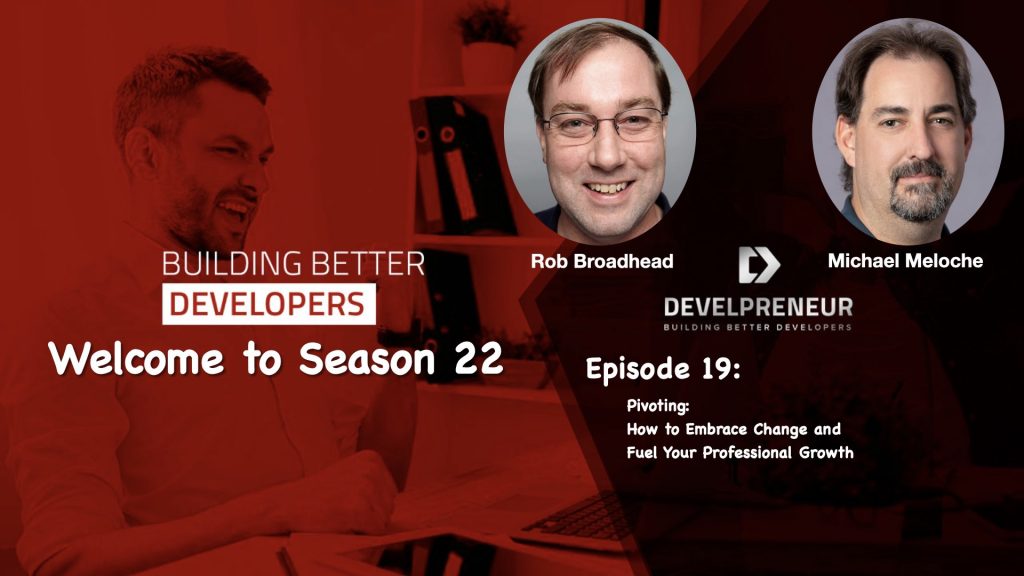In our latest podcast episode, we dive into the transformative power of pivoting in your career, particularly within the IT industry. Pivoting—making significant changes in your career direction or focus—is crucial for navigating the fast-paced tech world and achieving long-term success.
The Art of Pivoting: A Personal Journey
The episode starts with Rob sharing his journey through various pivoting phases. Beginning as a staff developer, he focused on coding, but his career took several turns. These pivots have significantly influenced his professional growth, from transitioning into management to shifting back to backend development, then moving into consulting, and even branching out into writing and podcasting. This personal narrative highlights how pivoting can open new doors and lead to unexpected opportunities.
Understanding Pivoting: More Than Just a Career Move
Pivoting isn’t merely about changing jobs or roles; it’s about adapting and evolving in response to your professional environment and personal goals. The hosts explain that pivoting can manifest in various ways:
- Technological Shifts: Moving from one technology stack to another (e.g., from Java to .NET) to keep up with industry trends or personal interests.
- Role Changes: Transitioning between different layers of development (e.g., from front-end to back-end) or taking on new responsibilities like team leadership or management.
- Specialization: Shifting from coding to designing or architecture to align with evolving skills and career aspirations.
By embracing these forms of pivoting, you can prevent stagnation and continue growing professionally.
Pivoting to Prevent Career Stagnation
The discussion emphasizes that pivoting is essential for avoiding career stagnation. If you find yourself plateauing in your current role, it may be time to consider a change. This could involve exploring new technologies, roles, or responsibilities that align with your evolving skills and interests. For instance, if your current work feels monotonous, learning a new technology or moving into a different role can rekindle your enthusiasm and lead to new career opportunities.
Leveraging Complementary Skills for Successful Pivoting
A key part of successful pivoting is leveraging complementary skills and maintaining a clear career roadmap. Regularly assessing your skills and experiences can help you identify areas for growth and opportunities for pivoting. For example, engaging in new projects or obtaining certifications can make the transition to a new role or technology smoother and more effective.
Pivoting for Job Satisfaction and Mental Well-Being
Not all pivoting is about climbing the career ladder; sometimes, it’s about improving your job satisfaction and mental well-being. The host cites Tim Ferris’s advice to stop investing time in things you dislike and to seek roles or projects that excite you. If you’re feeling overworked or unhappy in your current position, pivoting to a different role or company that aligns with your interests and values can significantly enhance your career satisfaction.
Practical Steps for Effective Pivoting
The podcast also offers practical advice for executing a successful pivot. If you’re feeling overwhelmed, taking a step back to reassess and simplify your workload can be beneficial. Focus on one task or project at a time rather than multitasking. This approach can help reduce stress and increase productivity. When making broader career changes, breaking down the process into manageable steps ensures a thoughtful and effective transition.
Embracing the Power of Pivoting
In summary, pivoting is a vital strategy for navigating your career and achieving professional growth. You can keep your career dynamic and fulfilling by embracing change, whether through technological shifts, role changes, or improving job satisfaction. Remember, to pivot is not just about moving up the ladder but also about aligning with your passions and adapting to new opportunities. Embrace the power of pivoting to fuel your professional growth and achieve long-term success.
Continuously Evolving Your Skill Sets
The journey from coder to developer is one of continuous learning and adaptation. As developers gain experience, they must recognize the evolving nature of their skill sets and adjust their professional strategies accordingly. By understanding the full scope of their value—beyond just coding—they can better navigate their careers, command higher rates, and take on more fulfilling roles that leverage their growing expertise.
Stay Connected: Join the Developreneur Community
We invite you to join our community and share your coding journey with us. Whether you’re a seasoned developer or just starting, there’s always room to learn and grow together. Contact us at [email protected] with your questions, feedback, or suggestions for future episodes. Together, let’s continue exploring the exciting world of software development.

